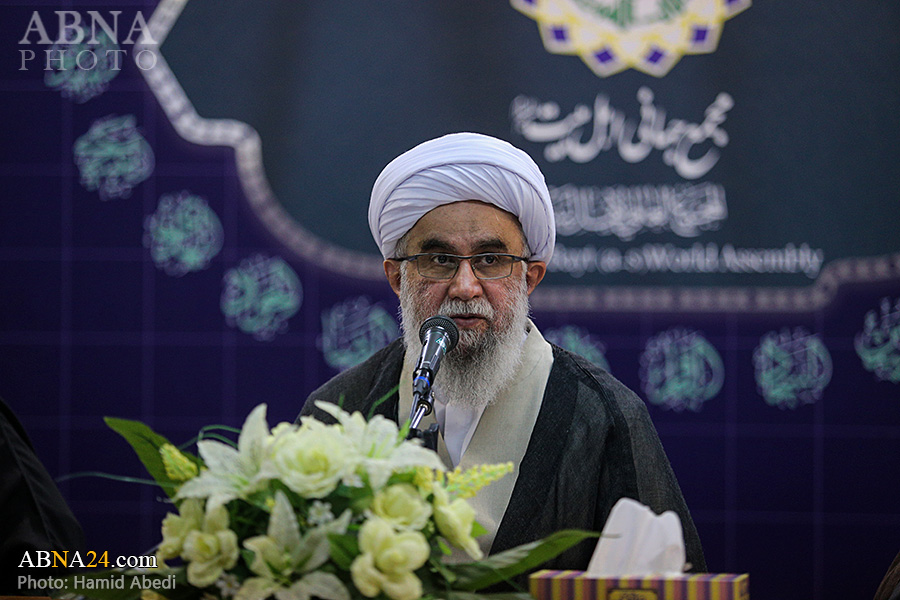- صفحه اصلی
- درباره همایش
- کمیته های علمی
- برگزارکنندگان و حامیان
- فراخوان ها
- فراخوان علمی همایش
- فراخوان کنگره شعر
- اخبار و گزارش ها
- اخبار همایش
- پیش نشست های علمی
- همایش سه روزه
- برای پژوهشگران
- درباره حضرت ابوطالب
- تراث ابوطالب
- شیوه نامه تألیف مقالات
- شعر و ادب
- نوحه
- چند رسانه ای
- دانلود پوستر و بروشور
- گالری تصاویر
- دانلود ویژه نامه ها
- ارتباط با همایش
- نشانی دبیر خانه
- ارسال مقالات
Fasting eliminates man’s shortcomings and adorned him with virtues: Ayatollah Ramazani
Secretary General of the AhlulBayt (a.s.) World Assembly stated, “Fasting makes a person realize his shortcomings, and tries to fix them, and removes vices from himself and becomes adorned with virtues.”
ABWA Official Website – During a speech, while referring to the virtue of the holy month of Ramadan, the month of answering prayers and forgiving sins, Ayatollah Reza Ramazani, Secretary General of the AhlulBayt (a.s.) World Assembly said, “Fasting somehow compensates for human shortcomings. Throughout the year, a person perhaps faces shortcomings and faults that fasting compensates for and gives him a kind of spiritual and physical health.”

“Fasting makes a person’s perspective positive,” he added, “It makes a person wise and avoids doing null and void actions. Fasting makes a person attain Ma’arifah (Divine knowledge), wisdom, and certainty, and ultimately benefits himself, his family, and society.”
Emphasizing the importance of vigil in the dawn during the holy month of Ramadan, the Secretary General of the AhlulBayt (a.s.) World Assembly expressed, “Dawn supplications is very great. Almsgiving during Ramadan breaks the back of Satan. One should help the needy as much as one can.”
“In the month of Ramadan, we should inspect our deeds, our actions, and our personal moves. Because, in this regard, the Prophet (p.b.u.h) stated, “حاسِبوا أنْفُسَكُم قَبلَ أنْ تُحاسَبوا، و زِنوها قَبلَ أنْ تُوزَنوا، و تَجَهَّزوا للعَرْضِ الأكْبَرِ” (Before being inspected, inspect yourself. Before you are measured, measure your soul on the weighing scale, and be prepared for that great judgment (The Day of Judgement).” Sometimes a person endures the hardship of fasting for a month but destroys its reward with a backbite. Why do we make trouble and pain for ourselves? Why should we annoy others? Don’t suffer and don’t suffer others,” Ayatollah Ramazani added.
“On the Qadr nights, we can act as if we are newly born (with no sin), the condition of which is to benefit from these great nights,” noted a member of the Council of Leadership Experts.
“Fasting makes a person realize his shortcomings, and tries to fix them, and removes vices from himself and becomes adorned with virtues,” Ayatollah Ramazani said in the end. /345/
Secretary General of the AhlulBayt (a.s.) World Assembly stated, “Fasting makes a person realize his shortcomings, and tries to fix them, and removes vices from himself and becomes adorned with virtues.”
ABWA Official Website – During a speech, while referring to the virtue of the holy month of Ramadan, the month of answering prayers and forgiving sins, Ayatollah Reza Ramazani, Secretary General of the AhlulBayt (a.s.) World Assembly said, “Fasting somehow compensates for human shortcomings. Throughout the year, a person perhaps faces shortcomings and faults that fasting compensates for and gives him a kind of spiritual and physical health.”

“Fasting makes a person’s perspective positive,” he added, “It makes a person wise and avoids doing null and void actions. Fasting makes a person attain Ma’arifah (Divine knowledge), wisdom, and certainty, and ultimately benefits himself, his family, and society.”
Emphasizing the importance of vigil in the dawn during the holy month of Ramadan, the Secretary General of the AhlulBayt (a.s.) World Assembly expressed, “Dawn supplications is very great. Almsgiving during Ramadan breaks the back of Satan. One should help the needy as much as one can.”
“In the month of Ramadan, we should inspect our deeds, our actions, and our personal moves. Because, in this regard, the Prophet (p.b.u.h) stated, “حاسِبوا أنْفُسَكُم قَبلَ أنْ تُحاسَبوا، و زِنوها قَبلَ أنْ تُوزَنوا، و تَجَهَّزوا للعَرْضِ الأكْبَرِ” (Before being inspected, inspect yourself. Before you are measured, measure your soul on the weighing scale, and be prepared for that great judgment (The Day of Judgement).” Sometimes a person endures the hardship of fasting for a month but destroys its reward with a backbite. Why do we make trouble and pain for ourselves? Why should we annoy others? Don’t suffer and don’t suffer others,” Ayatollah Ramazani added.
“On the Qadr nights, we can act as if we are newly born (with no sin), the condition of which is to benefit from these great nights,” noted a member of the Council of Leadership Experts.
“Fasting makes a person realize his shortcomings, and tries to fix them, and removes vices from himself and becomes adorned with virtues,” Ayatollah Ramazani said in the end. /345/



